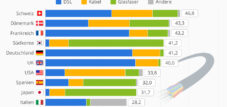Published on: April 21, 2025 / update from: April 21, 2025 - Author: Konrad Wolfenstein
Competition race for the Einstein telescope: Which region prevails?
Technology room ahead: the Einstein telescope as an opportunity for Europe
The Einstein telescope promises to catapult Europe at the center of gravitational wave research and to provide the selected region an economic billion dollar impulse. Three locations are currently competing for the prestigious project: the border triangle between Germany, Belgium and the Netherlands, the Saxon Lausitz and Sardinia in Italy. The two German applicants position themselves as favorites with considerable investments and political support. Particularly noteworthy: the hope of a “Silicon Valley” effect for the selected region, with thousands of new high-tech jobs and the formation of an innovative business cluster around laser technology, precision instruments and new materials.
Suitable for:
- Silicon Valley in Baden-Württemberg? The cyber Valley Stuttgart and Tübingen as an innovation engine for AI and robotics
The Einstein telescope: a revolutionary observatory underground
The Einstein telescope (ET) represents a groundbreaking concept for a third-generation European gravitational wave tendor. It will be about ten times more sensitive than the currently existing instruments and can examine a thousand times larger area of the universe in search of gravity waves. Unlike traditional optical telescopes, this extraordinary research facility is built completely underground at a depth of 200-300 meters in order to minimize disturbing environmental influences.
The technical conception of the Einstein telescope is impressively complex: it will consist of three nested detectors, each of which consists of two interferometers with 10 kilometers long arms. These form an underground triangle in which laser beams reflect on mirrors and sent back to their starting point. When a wave of gravity passes, the distance between the mirrors changes by a tiny amount - such as the hundred millionth part of a nuclear diameter. This minimal change in length is shown in a measurable change in the light intensity of the laser beam.
The scientific importance of this project can hardly be overestimated. The Einstein telescope will offer enormously improved sensitivity compared to current observatories. While current detectors, with a little luck, capture some neutron star collisions per year, "the Einstein telescope will be recorded in the same period of 100,000," as Harald Lück from the Max Planck Institute for Gravitation Physics Hannover and Vice-Coordinator of the Einstein Telescope Scientific Collaboration explains.
The location competition: three regions in hard competition
Three European regions currently apply intensively for the settlement of the Einstein telescope. The decision where this mega project is realized is expected to be made in 2026. Particularly noteworthy: Germany is represented in the race with two possible locations.
The border triangle: European cooperation at the German border
The Euregio Maas-Rhein, the border triangle between Germany, Belgium and the Netherlands around Aachen, Liège and Maastricht, presents itself as a strong candidate for the Einstein telescope. This region is characterized by an exceptionally high density of scientific institutions. "Nowhere in Europe is the density at universities, universities and research institutes as high as in North Rhine-Westphalia, right behind the Dutch border with Vaals and Kerkrade. There are more than 140 institutions," says the NMWP website (nanotechnology, micro system technology, materials and photonics).
The political support for this location is impressive. The state parliament of North Rhine-Westphalia unanimously explained its support for the Einstein telescope in November 2020 and commissioned the state government to "promote the Einstein telescope at all levels together with the Netherlands and Belgium". Minister of Economics Mona Neubaur visited the research and development laboratory Einstein-Telescope Pathfinder in Maastricht in March 2025 together with the Dutch Minister of Economics Dirk Beljaarts and government members of the three Belgian regions.
The Lausitz: a Saxon candidate with geological advantages
The second German applicant is the Lausitz region in Saxony. Specific steps have already been taken here to demonstrate the suitability of the location. In the spring of 2022, a trial bore took place in the municipality of Ralbitz-Rosenthal in Oberlausitz at a depth of 250 meters. The granite there, which goes back to volcanic activity around 570 million years ago, could offer an ideal vibration-free location for the Einstein telescope.
The application of the Lausitz is part of a larger initiative to promote structural change in lignite areas. Two major research institutions are to be built in the region, and the German Center for Astrophysics is one of the six candidates for this. Even if the location did not get the surcharge for the entire Einstein telescope, an experimental tunnel for new measurement methods could arise-provided the German Center for Astrophysics actually moves to near Görlitz.
The economic boost: billion dollar investments and high-tech jobs
The economic effects of the Einstein telescope go far beyond pure science. A study by the advisory company Ortelius commissioned by the Flemish Prime Minister Matthias Diependaele comes to the conclusion that the project could contribute to a productivity increase of up to 1.5 billion euros and could create around 925 full -time jobs in Flanders alone. These figures illustrate the enormous economic potential associated with the project.
North Rhine-Westphalia's Minister of Economic Affairs Mona Neubaur emphasizes: "The Einstein telescope is a huge opportunity for North Rhine-Westphalia and Europe. [...] It's not just about deciphering the secrets of the universe, but about concrete economic advantages: new jobs, high-tech innovations and strengthening our research landscape."
Companies are already preparing for the possible settlement of the telescope. Dr. Matthias Grosch, project manager at the German company NMWP from Düsseldorf, explains: "The Einstein Telescope offers unprecedented opportunities, both in an economic and scientific point of view. Knowledge institutes and companies are already preparing for the arrival of this mega project." He reports that companies are already carrying out tests with materials, cooling methods and the damping of possible vibrations and laser specialists have the first prototypes.
Suitable for:
On the way to Europe's Silicon Valley: innovation and growth
The Flemish Prime Minister Diependaele sees the project the chance to create a “Silicon Valley in the border region” that could promote an innovation -driven economy for the next 50 years. This vision of a European technology center, comparable to the Californian original, is not a mere rhetoric, but is based on specific growth expectations.
The consulting company Ortelius predicts that the formation of a high-tech cluster around the location of the Einstein telescope could increase the number of MINT graduates and that the number of doctoral students in the areas of science and technology could increase by 1.2 percent within a decade. This talent concentration is an essential feature of successful innovation ecosystems such as the Silicon Valley.
The development of a “valorization” process is particularly interesting, in which scientific knowledge is implemented in commercial applications. Matthias Grosch from the NMWP observed: "The project also becomes more specific and goes from the purely scientific phase into the valorization phase. Ideas are implemented in innovations and products." This link between basic research and commercial application is exactly what the Silicon Valley has done so successfully.
The schedule: decisive phase by 2026
The way to the final location decision is clearly structured. With the inclusion of the Einstein telescope to the ESFRI roadmap (European Strategy Forum on Research Infrastructures), a process was set in motion, which is to lead to the selection of the location in 2026. The applications must be submitted by 2024 at the latest.
Projects such as Etpathfinder (a prototype telescope) and e-test (scientific research and location search) provide important arguments for the respective location applications. These preparatory projects are crucial to demonstrate the technical feasibility and geological suitability of the locations.
In Germany, a task force for the Einstein telescope was recently launched to support the application of the border triangle. European Minister Nathanael Liminski brought central political actors and scientific representatives from the Netherlands, Belgium and Germany to the “Round Table Einstein-Telescope” in the Bonn town hall in 2022.
A unique opportunity for Germany and Europe
The Einstein telescope is a historical opportunity to strengthen Europe's leadership role in basic research and at the same time boost economic growth. With two promising locations in Germany - the border triangle near Aachen and Lausitz in Saxony - the Federal Republic is well in the race.
The economic perspectives are impressive: billion dollar investments, hundreds of new jobs and an innovation boost that could transform an entire region into a kind of European Silicon Valley. At the same time, the project shows the strength of European cooperation in large scientific undertaking.
As Economic Minister Neubaur emphasizes: "Projects like this are a small building block for a common and strong Europe - and that is more important than ever." At a time of increasing global competition, the Einstein telescope Europe could help to assert and expand its position as a leading science and technology region.
The intensive competition for the location of the Einstein telescope clearly shows that this is not just a scientific instrument, but about the future of high technology in Europe-and Germany is in the middle of the race.
Suitable for:
Your global marketing and business development partner
☑️ Our business language is English or German
☑️ NEW: Correspondence in your national language!
I would be happy to serve you and my team as a personal advisor.
You can contact me by filling out the contact form or simply call me on +49 89 89 674 804 (Munich) . My email address is: wolfenstein ∂ xpert.digital
I'm looking forward to our joint project.














